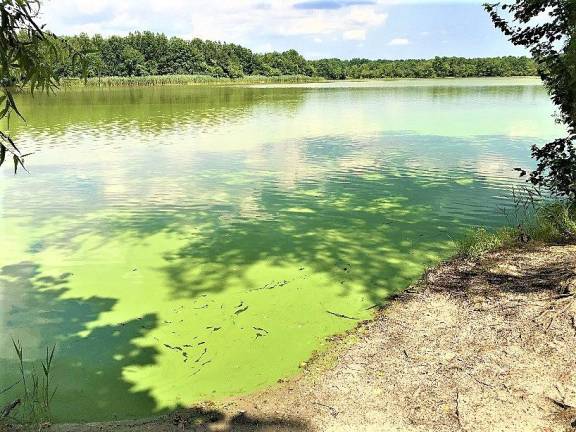DEP extends HAB grant deadline
Trenton. The New Jersey Department of Environmental Protection is extending the deadline for applications to a $2.5 grant program to combat Harmful Algal Blooms. Some 70 blooms were identified in the state last year, including Greenwood Lake and Lake Hopatcong.

The New Jersey Department of Environmental Protection has extended the application deadline by 15 days for a $2.5 million grant program to fund projects to help reduce the occurrence of harmful algal blooms in the state, the agency announced this week.
According to a DEP press release, the decision to extend the deadline for the harmful algal bloom management grant program to Jan. 27 follows a meeting last month with potential applicants who were looking for more financial flexibility and improved guidance in order to quickly implement projects to mitigate and/or control harmful algal blooms, also known as HABs.
As a result of this meeting, the DEP said it has published an updated notice that now allows in-kind services provided by applicants to be credited toward the program’s matching-fund grant eligibility requirement, thus helping local governments that are working on finalizing operating budgets for this year.
The DEP release said it has also provided examples for clarity on what constitutes an eligible match, including short-term operation and maintenance of the demonstration project.
“Reducing the impacts these blooms have on public health, the environment and our economy is of utmost importance to the state,” Commissioner Catherine R. McCabe said in the release. “We fully understand the current budget planning needs of municipalities and counties that are interested in applying for grants and are committed to working closely with them to get these projects launched as soon as possible.”
In November, Gov. Phil Murphy announced a comprehensive harmful algal bloom strategy that includes $13.5 million in funding for local projects that will improve water quality and help prevent, mitigate and manage harmful algal blooms in lakes and ponds.
This effort earmarks $10 million in Clean Water State Revolving Fund money as principal-forgiveness (grant-like) funding for projects that address HABs by improving water quality.
According to the release, the administration is also providing $3.5 million from two grant programs for projects addressing harmful algal blooms.
Specifically, the modifications apply to the $2.5 million harmful algal bloom management grant program, in which the state provides $2 in funding for every $1 invested by the applicant.
In-kind services directly related to the proposed project may now be used to count toward the local match for these projects, but applicants are advised that this may change in possible future grant opportunities and that they should begin budgetary planning accordingly.
Harmful algal blooms, also known as HABs, are not true algal blooms, according to the DEP.
Rather, they are caused by naturally occurring cyanobacteria that can reproduce to unhealthful levels under certain conditions, including sunlight, nutrients from sources such as fertilizers and improperly operating septic systems, warm weather and stagnant water, according to the agency.
They frequently form dense mats, resembling pea soup or spilled paint.
Exposure to blooms can result in a range of health effects, including rashes, allergy-like reactions, flu-like symptoms, gastroenteritis, respiratory irritation and eye irritation.
Exposure to a bloom that is actively producing cyanotoxins may result in more serious health effects, including liver toxicity and neurological effects, the agency said in the release.
People, pets and wildlife are susceptible to adverse health effects if they come into contact with or ingest water that is experiencing a bloom.
For more information on harmful algal blooms, visit www.state.nj.us/dep/hab
In all, more than 70 suspected blooms were reported last year, with 39 confirmed.
These blooms resulted in health and water-contact advisories, closures of bathing beaches and, in some cases, had direct impacts on tourism-related businesses, the agency said.